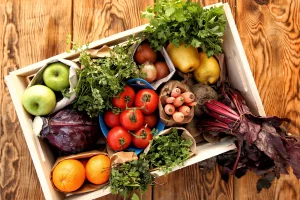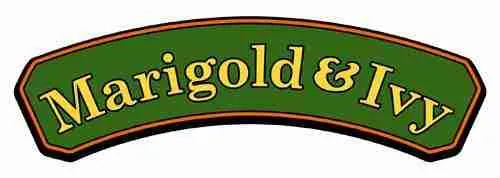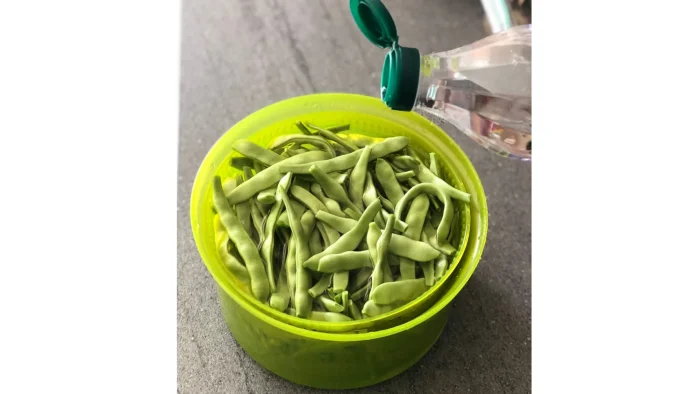Including fruits and vegetables in your diet is vital to keep you healthy. Considering their nutritional benefits, selecting, preparing, and cleaning them is crucial. But how can you do so? Is water enough to keep them clean? Or does vinegar clean fruits and vegetables?
Yes, vinegar cleans fruits and vegetables. Vinegar is a magical little ingredient with endless uses and benefits for cleaning.
Since most people eat fruits and vegetables raw, cleaning them with vinegar will help remove any pesticides, bacteria, or other impurities that can be harmful.
Are you curious how you can better clean your fruits and vegetables? Here’s what you need to learn to clean them well, how vinegar works to clean them, and some tips to make them last longer and avoid contamination.
Is It Safe to Wash Fruits and Vegetables with Vinegar?
Yes, it is safe to wash fruits and vegetables with vinegar. This ingredient also works well in keeping your fresh produce safer to consume. The acidity of vinegar can kill bacteria because the acid penetrates the bacteria’s cell membrane, making the cell die.
However, we are referring to vinegar such as distilled white vinegar and apple cider vinegar. There are different types of vinegar, so if you are looking for one to use to wash your fresh produce, buy the ones that contain 4% to 7% acidic levels.
Avoid vinegar used for agricultural or cleaning purposes with around 20% acetic acid or used specifically for cooking.
Why Is It Important to Clean Fruits and Vegetables with Vinegar?
To avoid ingesting bacteria and chemicals, it is essential to wash your fresh produce with vinegar. While you can clean fruits and vegetables with water, it might not be enough to remove everything altogether.
Organic fruits and vegetables won’t have pesticides and chemicals on them. However, this does not mean you should be complacent about cleaning your fresh produce with water.
Even organic fruits and vegetables may also have unwanted bacteria. As such, it’s crucial to clean them with a vinegar wash.
It’s not always possible to buy fresh organic produce. When you buy conventional produce, fruits and vegetables may have bacteria, chemicals, and other residual pesticides. So, to ensure they are clean enough to eat, use vinegar to help eliminate bacteria and chemicals.
What Type of Vinegar Should You Use to Clean Fruits and Vegetables?
As mentioned earlier, there are various types of vinegar, but not all are safe to clean your fruits and vegetables with. Distilled white vinegar and apple cider vinegar are your best and safest choice. Both are safe to cook with and use to clean your coffee pot, so there’s no need to worry if you rinse your fruits and vegetables with them.
To learn how to clean your coffee pot with apple cider vinegar, read our article – Will Apple Cider Vinegar Clean a Coffee Pot?
What Fruits and Vegetables Can You Wash in Vinegar?

All fruits and vegetables should be washed and cleaned with vinegar before eating them. But there are a few fruits and vegetables with skin that you need to peel before eating them. These don’t need thoroughly cleaned.
But fruits and vegetables eaten raw with the skin should be soaked with vinegar for a while before eating them. This way, you will be assured you are removing harmful chemicals and bacteria.
Will Vinegar Affect the Taste and Texture of Fruits and Vegetables?
Vinegar may affect the taste and texture of your fresh produce. To avoid this, rinse them with water so the solution won’t affect their taste.
How to Clean Fruits and Vegetables with Vinegar?
The easiest way to clean fruits and vegetables is with a vinegar solution. Making one is simple and requires a few ingredients. Here’s a guide to help you make them.
Things you’ll need:
- Diluted vinegar (or apple cider vinegar)
- Water
- Lemon juice (optional)
- Bowl/spray bottle
Instructions
Step 1. Mix diluted white vinegar or apple cider vinegar with water (50/50).
Step 2. (Optional) If you want a citrus flavor, add lemon juice.
Step 3. Depending on how you wash your fruit, you can put the mixture in a bowl to soak your fresh produce. Or you can put the solution in a spray bottle and spray them.
How to Wash Fruits and Vegetables with Vinegar
You can wash fruits and vegetables with vinegar in two ways: spray bottle or soaking. The best method will depend on the type of fruits and vegetables you are cleaning.
Clean larger fruits and veggies using a spray bottle. On the other hand, soak small fresh produce in a bowl of vinegar for better cleaning.
Spray Bottle Method
Step 1. Put the vinegar and water solution in a spray bottle and shake it well.
Step 2. Place your fruits and veggies in a colander and spray them with the spray bottle of vinegar.
Step 3. Allow the solution to sit for about 5 minutes, then rinse them with cold water.
Step 4. Dry your fresh produce with paper towels.
Soaking Method
Step 1. Put the vinegar solution into a large bowl.
Step 2. Soak the fruit and veggies by submerging them in the solution.
Step 3. Let them sit in for about 15 minutes, then strain.
Step 4. Rinse your fresh produce to remove the vinegar solution, then pat dry.
How Long Should You Soak Fruits and Vegetables in Vinegar?

It will depend on which fruits and veggies you are going to eat. For fruits and vegetables you can eat quickly without removing the skin, you should soak them in a bowl of vinegar solution for 15 minutes. This will allow the solution to work magic, especially in removing dirt, bacteria, and other chemicals.
For fruits and vegetables you don’t eat raw, spray them with vinegar and let the solution sit for about 5 minutes. There’s no need to clean them thoroughly because you need to peel the skin afterward.
Whether you soak or spray your produce with vinegar, it’s important to rinse them with water after using vinegar. This will ensure that the solution will not affect the taste and texture of your fresh produce.
Conclusion
We hope we have clarified the answer to your question, “Does vinegar clean fruits and vegetables?” Indeed, cleaning fruits and vegetables of all types with vinegar is crucial to food safety because the solution can remove harmful bacteria and chemicals and prevent cross-contamination.
To get the most benefit from your fresh fruits and vegetables, wash them with vinegar that contains 4% to 7% acidic levels, and to effectively clean your fruits and vegetables, use our step-by-step instructions and tips above.
To learn what else you can use apple cider vinegar to clean in your home, read our article – Can I Use Apple Cider Vinegar to Clean My Dishwasher?
If you want to learn what other method besides vinegar you can use to clean your fresh produce, check our article – Does Baking Soda Clean Fruit?
Question – Do you use vinegar to clean your fruits and vegetables?

